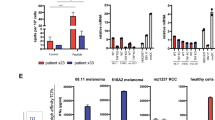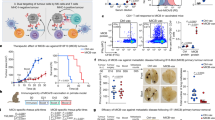Abstract
The TP53 tumor suppressor gene contains a well-studied polymorphism that encodes either proline (P) or arginine (R) at codon 72, and over half of the world’s population is homozygous for R at this codon. The wild-type sequence (wt) p53 peptide, p5365–73, has been identified as a CD8+ T cell-defined tumor antigen for use in broadly applicable cancer vaccines. However, depending on the TP53 codon 72 polymorphism of the recipient, the induced responses to the peptides incorporating R (p5372R) or P (p5372P) can be “self” or “non-self.” Thus, we sought to determine which wt p5365–73 peptide should be used in wt p53-based cancer vaccines. Despite similar predicted HLA-A2-binding affinities, the p5372P peptide was more efficient than the p5372R peptide in HLA-A2 stabilization assays. In vitro stimulation (IVS) of CD8+ T cells obtained from healthy HLA-A2+ donors with these two peptides led to the generation of CD8+ T cell effectors in one-third of the samples tested, at a frequency similar to the responsiveness to other wt p53 peptides. Interestingly, regardless of their p53 codon 72 genotype, CD8+ T cells stimulated with either p5372P or p5372R peptide were cross-reactive against T2 cells pulsed with either peptide, as well as HLA-A2+ head and neck cancer (HNC) cell lines presenting p5372P and/or p5372R peptides for T cell recognition. Therefore, the cross-reactivity of CD8+ T cells for the polymorphic wt p5365–73 peptides, irrespective of their p53 codon 72 polymorphism, suggests that employing either peptide in wt p53-based vaccines can result in efficient targeting of this epitope.





Similar content being viewed by others
References
Gnjatic S, Cai Z, Viguier M, Chouaib S, Guillet JG, Choppin J (1998) Accumulation of the p53 protein allows recognition by human CTL of a wild-type p53 epitope presented by breast carcinomas and melanomas. J Immunol 160(1):328–333
Theobald M, Biggs J, Dittmer D, Levine AJ, Sherman LA (1995) Targeting p53 as a general tumor antigen. Proc Natl Acad Sci USA 92(26):11993–11997
Offringa R, Vierboom MP, van der Burg SH, Erdile L, Melief CJ (2000) p53: a potential target antigen for immunotherapy of cancer. Ann N Y Acad Sci 910:223–233 discussion 233-6
Chikamatsu K, Nakano K, Storkus WJ, Appella E, Lotze MT, Whiteside TL et al (1999) Generation of anti-p53 cytotoxic T lymphocytes from human peripheral blood using autologous dendritic cells. Clin Cancer Res 5(6):1281–1288
Hald J, Rasmussen N, Claesson MH (1995) Tumour-infiltrating lymphocytes mediate lysis of autologous squamous cell carcinomas of the head and neck. Cancer Immunol Immunother 41(4):243–250
Ropke M, Regner M, Claesson MH (1995) T cell-mediated cytotoxicity against p53-protein derived peptides in bulk and limiting dilution cultures of healthy donors. Scand J Immunol 42(1):98–103
Barfoed AM, Petersen TR, Kirkin AF, Thor Straten P, Claesson MH, Zeuthen J (2000) Cytotoxic T-lymphocyte clones, established by stimulation with the HLA-A2 binding p5365–73 wild type peptide loaded on dendritic cells in vitro, specifically recognize and lyse HLA-A2 tumour cells overexpressing the p53 protein. Scand J Immunol 51(2):128–133
McCarty TM, Yu Z, Liu X, Diamond DJ, Ellenhorn JD (1998) An HLA-restricted, p53 specific immune response from HLA transgenic p53 knockout mice. Ann Surg Oncol 5(1):93–99
Nijman HW, Van der Burg SH, Vierboom MP, Houbiers JG, Kast WM, Melief CJ (1994) p53, a potential target for tumor-directed T cells. Immunol Lett 40(2):171–178
Theobald M, Biggs J, Hernandez J, Lustgarten J, Labadie C, Sherman LA (1997) Tolerance to p53 by A2.1-restricted cytotoxic T lymphocytes. J Exp Med 185(5):833–841
Petersen TR, Buus S, Brunak S, Nissen MH, Sherman LA, Claesson MH (2001) Identification and design of p53-derived HLA-A2-binding peptides with increased CTL immunogenicity. Scand J Immunol 53(4):357–364
Hoffmann TK, Loftus DJ, Nakano K, Maeurer MJ, Chikamatsu K, Appella E et al (2002) The ability of variant peptides to reverse the nonresponsiveness of T lymphocytes to the wild-type sequence p53(264–272) epitope. J Immunol 168(3):1338–1347
Schneider-Stock R, Mawrin C, Motsch C, Boltze C, Peters B, Hartig R et al (2004) Retention of the arginine allele in codon 72 of the p53 gene correlates with poor apoptosis in head and neck cancer. Am J Pathol 164(4):1233–1241
Buchman VL, Chumakov PM, Ninkina NN, Samarina OP, Georgiev GP (1988) A variation in the structure of the protein-coding region of the human p53 gene. Gene 70(2):245–252
Lin CJ, Grandis JR, Carey TE, Gollin SM, Whiteside TL, Koch WM et al (2007) Head and neck squamous cell carcinoma cell lines: established models and rationale for selection. Head Neck 29(2):163–188
Heo DS, Snyderman C, Gollin SM, Pan S, Walker E, Deka R et al (1989) Biology, cytogenetics, and sensitivity to immunological effector cells of new head and neck squamous cell carcinoma lines. Cancer Res 49(18):5167–5175
Ferris RL, Martinez I, Sirianni N, Wang J, Lopez-Albaitero A, Gollin SM et al (2005) Human papillomavirus-16 associated squamous cell carcinoma of the head and neck (SCCHN): a natural disease model provides insights into viral carcinogenesis. Eur J Cancer 41(5):807–815
Balz V, Scheckenbach K, Gotte K, Bockmuhl U, Petersen I, Bier H (2003) Is the p53 inactivation frequency in squamous cell carcinomas of the head and neck underestimated? Analysis of p53 exons 2–11 and human papillomavirus 16/18 E6 transcripts in 123 unselected tumor specimens. Cancer Res 63(6):1188–1191
Sirianni N, Ha PK, Oelke M, Califano J, Gooding W, Westra W et al (2004) Effect of human papillomavirus-16 infection on CD8+ T cell recognition of a wild-type sequence p53264–272 peptide in patients with squamous cell carcinoma of the head and neck. Clin Cancer Res 10(20):6929–6937
Birgander R, Sjalander A, Rannug A, Alexandrie AK, Sundberg MI, Seidegard J et al (1995) p53 polymorphisms and haplotypes in lung cancer. Carcinogenesis 16(9):2233–2236
Salter RD, Cresswell P (1986) Impaired assembly and transport of HLA-A and -B antigens in a mutant TxB cell hybrid. EMBO J 5(5):943–949
Parham P, Barnstable CJ, Bodmer WF (1979) Use of a monoclonal antibody (W6/32) in structural studies of HLA-A, B, C, antigens. J Immunol 123(1):342–349
Parham P, Bodmer WF (1978) Monoclonal antibody to a human histocompatibility alloantigen, HLA-A2. Nature 276(5686):397–399
Rammensee H, Bachmann J, Emmerich NP, Bachor OA, Stevanovic S (1999) SYFPEITHI: database for MHC ligands and peptide motifs. Immunogenetics 50(3–4):213–219
Filho PA, Lopez-Albaitero A, Xi L, Gooding W, Godfrey T, Ferris RL (2009) Quantitative expression and immunogenicity of MAGE-3 and -6 in upper aerodigestive tract cancer. Int J Cancer 125(8):1912–1920
Bullock TN, Mullins DW, Colella TA, Engelhard VH (2001) Manipulation of avidity to improve effectiveness of adoptively transferred CD8(+) T cells for melanoma immunotherapy in human MHC class I-transgenic mice. J Immunol 167(10):5824–5831
Cairey-Remonnay S, Humbey O, Mougin C, Algros MP, Mauny F, Kanitakis J et al (2002) TP53 polymorphism of exon 4 at codon 72 in cutaneous squamous cell carcinoma and benign epithelial lesions of renal transplant recipients and immunocompetent individuals: lack of correlation with human papillomavirus status. J Invest Dermatol 118(6):1026–1031
Rosenthal AN, Ryan A, Al-Jehani RM, Storey A, Harwood CA, Jacobs IJ (1998) p53 codon 72 polymorphism and risk of cervical cancer in UK. Lancet 352(9131):871–872
Shen H, Zheng Y, Sturgis EM, Spitz MR, Wei Q (2002) P53 codon 72 polymorphism and risk of squamous cell carcinoma of the head and neck: a case–control study. Cancer Lett 183(2):123–130
Sourvinos G, Rizos E, Spandidos DA (2001) p53 codon 72 polymorphism is linked to the development and not the progression of benign and malignant laryngeal tumours. Oral Oncol 37(7):572–578
Albers AE, Ferris RL, Kim GG, Chikamatsu K, De Leo AB, Whiteside TL (2005) Immune responses to p53 in patients with cancer: enrichment in tetramer +p53 peptide-specific T cells and regulatory T cells at tumor sites. Cancer Immunol Immunother 54(11):1072–1081
Acknowledgments
Supported by PO1 DE12321, P50 CA097190, the Triological Society Research Training Grant, the American College of Surgeons/American Head and Neck Society Career Development Award and the Stout Family Fund for Head and Neck Cancer Research.
Author information
Authors and Affiliations
Corresponding author
Rights and permissions
About this article
Cite this article
Andrade Filho, P.A., Ito, D., DeLeo, A.B. et al. CD8+ T cell recognition of polymorphic wild-type sequence p5365–73 peptides in squamous cell carcinoma of the head and neck. Cancer Immunol Immunother 59, 1561–1568 (2010). https://doi.org/10.1007/s00262-010-0886-1
Received:
Accepted:
Published:
Issue Date:
DOI: https://doi.org/10.1007/s00262-010-0886-1




